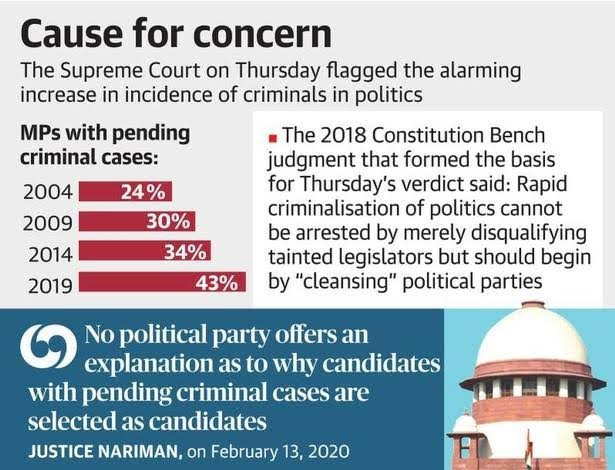Ahmedabad
(Head Office)Address : 506, 3rd EYE THREE (III), Opp. Induben Khakhrawala, Girish Cold Drink Cross Road, CG Road, Navrangpura, Ahmedabad, 380009.
Mobile : 8469231587 / 9586028957
Telephone : 079-40098991
E-mail: dics.upsc@gmail.com

Criminalization of Politics
News: Recently, the Association for Democratic Reforms (ADR) wrote to the Election Commission (ECI), seeking action against political parties that failed to publish details of criminal records of their candidates as per orders of the Supreme Court and the ECI.
Background:
• Activists and independent electoral watchdogs like ADR have been raising concerns over criminalisation of politics for a long time.
• The increasing trend of criminalisation of politics poses a significant threat to the democratic system.
What is Criminalization of Politics?
• The criminalisation of politics refers to the phenomenon where individuals with criminal backgrounds or pending criminal cases actively participate in politics and hold positions of power. It signifies the infiltration of criminal elements into the political system, compromising the integrity and functioning of democratic institutions.
Status of Criminalization Politics:
• Increase in the number of MPs with criminal charges: In 2004, 24% of parliamentarians had pending criminal cases, which rose to 43% in 2019.
• As per media reports of February 2022, the number of pending criminal cases against sitting and former MLA’s and MP’s had risen close to 5,000 towards the end of December 2021.
• In the 2019 Lok Sabha elections, 159 MPs had declared serious criminal cases against them.
What are the causes of Criminalization of Politics?
• Vote Bank politics - Money and muscle power of criminals help political parties gain votes. Factors such as caste, religion take central stage while criminal antecedents of candidates take the back seat giving an edge to criminals.
• Black money and money power - Electoral politics is largely dependent on the money and the funding that it receives. Since candidates with criminal records often possess greater wealth, they ensure greater inflow in money, labour and other advantages that may help a party in successful campaign, and also possess greater ‘winnability’.
• Lack of Intra-party democracy - Political parties in India largely lack intra-party democracy and the decisions on candidature are largely taken by the elite leadership of the party. Thus, politicians with criminal records often escape the scrutiny by local workers and organisation of the party.
• The government often are attracted towards strongmen (criminals) to address their failure in ensuring socio-economic development. These strongmen with money, resources and connections are expected to fulfill needs of people.
• Factors such as lack of intra-party democracy, centralization of powers in political parties ensure that candidates with criminal antecedents escape the scrutiny of local level workers.
• Poor implementation of laws – For example, it is mandatory for political parties to publish criminal records if any of candidates on their websites, social media accounts, newspaper etc for voter’s awareness but it isn’t implemented in letter and spirit and political parties get away with it many times.
What are the impacts of Criminalization of Politics?
impacts
Undermines Democracy
Poor Governance - When law
breakers make laws, it weakens Governance
Increases Criminal activities
Social Disharmony
Undermines Rule of Law
Economic and social development takes a backseat
Potential threat to National security
What are the measures taken to curb Criminalization of Politics in India?
| Basis | Suggestions |
| Union Government | It set up 12 special courts for a year to fast track trial of criminal cases against MPs and MLAs (2017) |
| Supreme Court | 1. It ruled that every candidate contesting election has to declare his criminal and financial records along with educational qualifications (2002) 2. In Lily Thomas vs Union of India – MPs or MLAs convicted of a crime and sentenced to prison term of 2 years or more are disqualified from holding office. 3. Public Interest Foundation vs Union of India case, 2018 had also directed political parties to publish online the pending criminal cases of their candidates. |
| ADR | It recommends permanent disqualification of candidates convicted of serious criminal offences from contesting elections. |
| Legal Aspects | Section 8 of Representation of Peoples Act 1951 disqualifies individuals punished with a jail term of more than two years from standing in elections for six years after the jail term has ended. |
What else can be done?
• Pressure on political parties to follow the rule of law and not let criminals take the center stage. Active citizen participation and awareness on their side is equally important.
• Implement recommendation of committees such as Vohra Committee (1993) and Goswami Committee and law commission report (170 and 244th), which have raised alarm bells long ago.
• 2nd ARC recommended amending section 8 of RPA to disqualify all persons facing charges related to grave and heinous offences and corruption, where charges have been framed six months before the election.
Conclusion
• It is not enough for India to be the world’s largest democracy – it must evolve into an ideal one.

Address : 506, 3rd EYE THREE (III), Opp. Induben Khakhrawala, Girish Cold Drink Cross Road, CG Road, Navrangpura, Ahmedabad, 380009.
Mobile : 8469231587 / 9586028957
Telephone : 079-40098991
E-mail: dics.upsc@gmail.com
Address: A-306, The Landmark, Urjanagar-1, Opp. Spicy Street, Kudasan – Por Road, Kudasan, Gandhinagar – 382421
Mobile : 9723832444 / 9723932444
E-mail: dics.gnagar@gmail.com
Address: 2nd Floor, 9 Shivali Society, L&T Circle, opp. Ratri Bazar, Karelibaugh, Vadodara, 390018
Mobile : 9725692037 / 9725692054
E-mail: dics.vadodara@gmail.com
Address: 403, Raj Victoria, Opp. Pal Walkway, Near Galaxy Circle, Pal, Surat-394510
Mobile : 8401031583 / 8401031587
E-mail: dics.surat@gmail.com
Address: 303,305 K 158 Complex Above Magson, Sindhubhavan Road Ahmedabad-380059
Mobile : 9974751177 / 8469231587
E-mail: dicssbr@gmail.com
Address: 57/17, 2nd Floor, Old Rajinder Nagar Market, Bada Bazaar Marg, Delhi-60
Mobile : 9104830862 / 9104830865
E-mail: dics.newdelhi@gmail.com